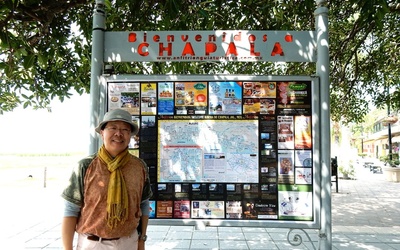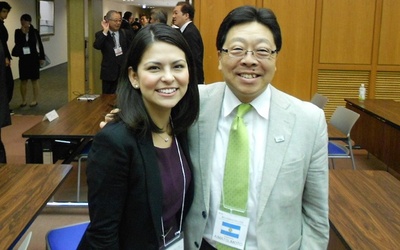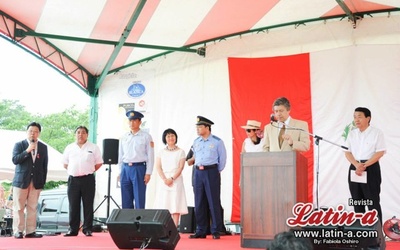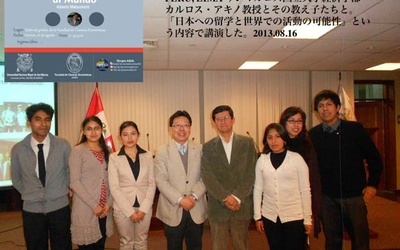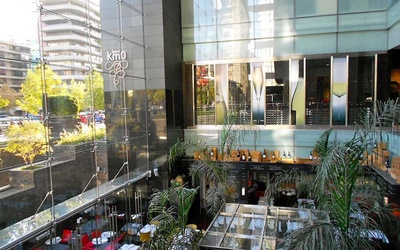
Alberto J. Matsumoto
@albertomatsumotoNisei Japanese-Argentine. In 1990, he came to Japan as a government-financed international student. He received a Master’s degree in Law from the Yokohama National University. In 1997, he established a translation company specialized in public relations and legal work. He was a court interpreter in district courts and family courts in Yokohama and Tokyo. He also works as a broadcast interpreter at NHK. He teaches the history of Japanese immigrants and the educational system in Japan to Nikkei trainees at JICA (Japan International Cooperation Agency). He also teaches Spanish at the University of Shizuoka and social economics and laws in Latin America at the Department of law at Dokkyo University. He gives lectures on multi-culturalism for foreign advisors. He has published books in Spanish on the themes of income tax and resident status. In Japanese, he has published “54 Chapters to Learn About Argentine” (Akashi Shoten), “Learn How to Speak Spanish in 30 Days” (Natsumesha) and others. http://www.ideamatsu.com
Updated June 2013
Stories from This Author
Considering Mexico's Immigration Issues in Mexico —Visiting the University of Guadalajara in October 2014—
Jan. 26, 2015 • Alberto J. Matsumoto
Mexico is the second most popular destination for students and working adults interested in Spanish-speaking countries for study abroad or training, after Spain. It is well known for its cheerful and bright national character, richly flavored cuisine, and tequila (a distilled liquor with an alcohol content of 45 to 50%), and attracts many Japanese people. Some of my students have traveled there during summer vacation, and some have even found employment at Japanese companies there after graduation. Economically, the country …
Employment of Japanese university graduates and second generation foreigners
Dec. 8, 2014 • Alberto J. Matsumoto
Japan's education system is highly regarded around the world, and in the 2012 OECD learning achievement survey of 15-year-olds, Japan ranked 8th in mathematical literacy, 3rd in reading comprehension, and 3rd in scientific literacy.1 The standard of secondary education up to high school is also very high, with 98% of graduates who complete compulsory education (elementary and junior high school) going on to high school, the highest level in the world. After that, 53.5 % go on to university.2 16.8% …
Differences and Similarities between Peruvians and Brazilians Living in Japan
Sept. 17, 2014 • Alberto J. Matsumoto
It has been a quarter century since Japanese migrant workers from South America arrived in Japan, but to Japan, the host country, these migrant workers are from "South America," and there has been little awareness of the differences in their countries of origin or their reactions to support measures. The largest Japanese community in South America is Portuguese-speaking Brazil (1.4 million people), and before the Lehman Shock in 2008, there were 310,000 Japanese Brazilians living in Japan. On the other …
Will foreign workers' wages rise?
Sept. 3, 2014 • Alberto J. Matsumoto
Since the Abe administration came to power, there has been much talk about wage increases aimed at expanding domestic demand. This trend is being seen in some large companies and the restaurant industry, where the latter, which are facing a labor shortage, are turning employees who were employed on part-time or casual contracts into full-time employees, enrolling them in social insurance, and working to improve working conditions to secure a more stable workforce. This has resulted in a real wage …
日本人の海外移住、100年以上の足跡とは
June 10, 2014 • Alberto J. Matsumoto
私は10数年前から南米のJICA日系研修員や留学生に対して、この一世紀半の間、日本人がどのような経緯や目的で移住し、どの国や地域に定住または転住し、そしてどのような功績を残してきたかについて、レクチャーしている。受講生たちには、自分たちの祖先の思いや期待、数々の挫折や無力感、歴史に翻弄されながらも開拓した生活と事業、子孫に残してきた伝統と教えなどについて、考えてもらうようにしている。 1868年に日本政府が正式に移住者をハワイ王国に送り出したが1、移住先では他の国の移…
移民労働の受入れ議論が再燃
May 21, 2014 • Alberto J. Matsumoto
2014年現在、この日本で30年前と同様に一部の業界で発生している人手不足を理由に、外国人労働者の受入れ議論が展開されている。2020年の五輪開催に必要なインフラ建設、既存のインフラ補修、東日本の震災後の復興事業、新規交通網のインフラ整備等、老朽した住宅や公共施設の解体や耐震補強等、ほとんどが建設関連の事業であり、かなり深刻な人手不足である。90年代初期のバブル崩壊後、建設業界は大きな影響を受け公共事業も大幅に削減されたため、建設会社の数も半分以下になり、多くの従業員が転職…
日本のグローバル人材 パート2
Feb. 17, 2014 • Alberto J. Matsumoto
「南米の日系人はグローバル人材か?」 前回のパート11では、「グローバル人材」とは、「(1)語学力・コミュニケーション能力、(2)主体性・積極性、チャレンジ精神、協調性・柔軟性、責任感・使命感、(3)異文化に対する理解と日本人としてのアイデンティティー」だと定義した。しかし企業は、「海外の事業所で自立的・自主的に発言・行動できる」「多様な考えを持つ人と協調して仕事を進められる」という条件を重視している。 そうしたなか、最近ジェトロやJICAが、日系企業、主に中小企業の南米…
南米の格差と治安、そして日系人たち ~その2
Feb. 3, 2014 • Alberto J. Matsumoto
その1を読む >> 南米諸国で、格差のほかに懸念材料となっているのが治安である。これは、ほとんどの国で悪化しており、経済成長とは裏腹に社会の安全が脅かされている。 財政的基盤が弱い国は制度的に統治機関が貧弱であり、慢性的汚職体質が警察、検察当局をはじめ、ほぼすべての役所に広がっており、そのため司法も機能不全に陥っている。そして多くの国や地域では麻薬カルテルの違法活動が社会の隅々まで浸透しているため、暴力が蔓延している。 メキシコでは、2006年から2012年までの間麻薬…
南米の格差と治安、そして日系人たち ~その1
Jan. 27, 2014 • Alberto J. Matsumoto
中南米諸国の経済成長には光と影がある。その影は独立前からの構造的な要素も含まれているのかも知れないが、建国以降常に指摘されてきた市民の教育問題や社会の治安問題が改めてクローズアップされている。近代国家になってから階級社会の格差も多少改善されたところもあれば、むしろ拡大したところもある。 ほとんどの国が幾度かの「革命」を体験してきたが、今もその「革命」とやらを継続している国々が存在する。より公平で社会正義を満たすための政治行動であったが、軍政権と民政を、右派と左派政権を繰り…
近年の南米の経済成長と日系人たち
Jan. 8, 2014 • Alberto J. Matsumoto
中南米諸国は2年前から地域の平均成長率が3%前後に低下するなど多少低迷していたが、近年の経済成長率は10%前後上昇することも珍しくなく、穀物や鉱物資源の価格高騰によって今は消費市場としても有力視されている。 ブラジルは一人当たりの年間平均所得が12,000ドル、失業率は4.6%(ここ数十年でもっとも低い)、輸出額は24兆円で、新興国の中ではリーダー的存在であり国内総生産GDPも230兆円相当という日本の半分近くまで追いつき、ラテンアメリカ(以下、ラ米)諸国全体の半分を占め…

